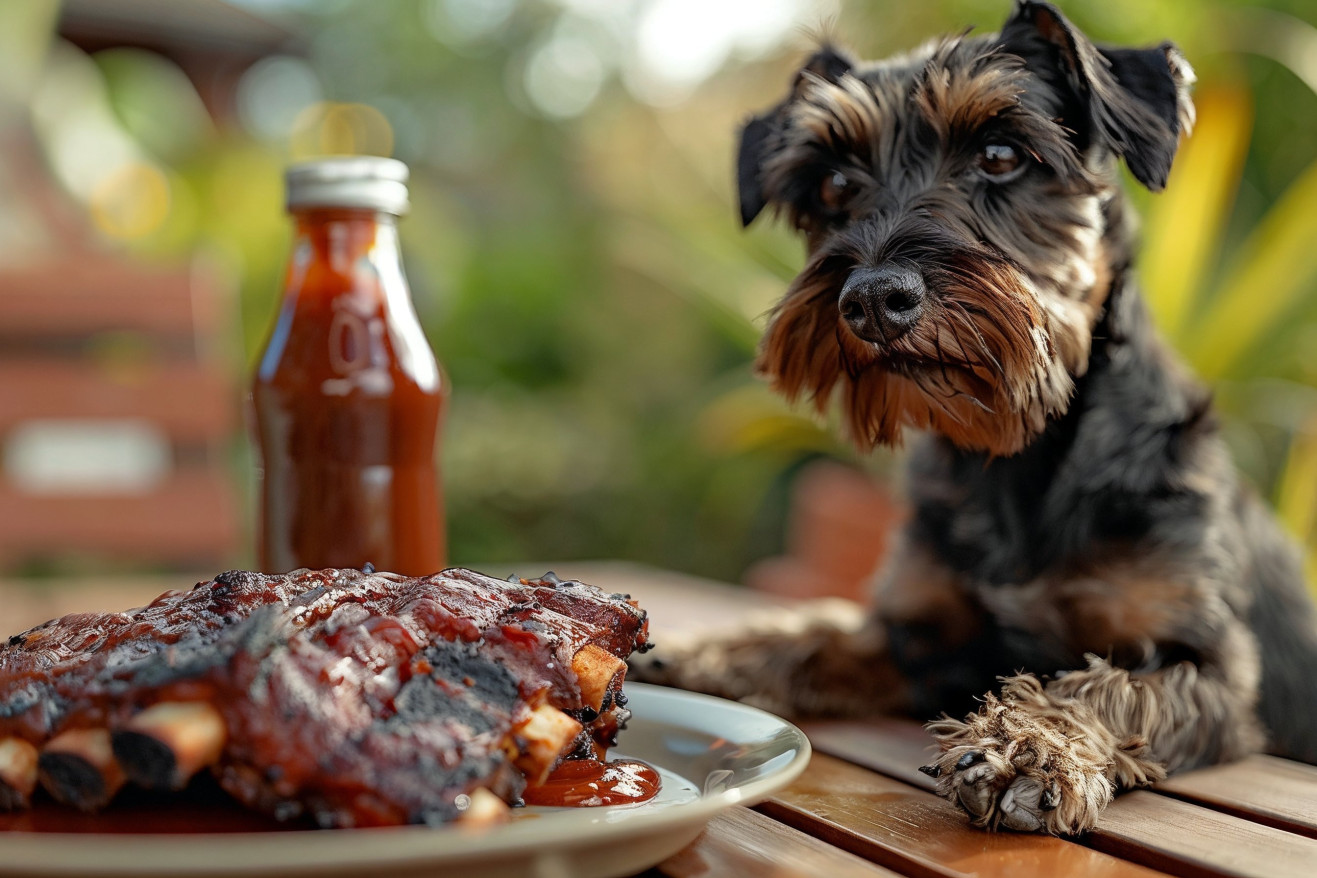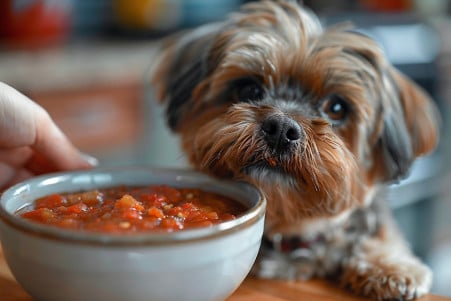Can Dogs Eat BBQ Sauce? Uncovering the Risks for Canine Health
28 February 2024 • Updated 27 February 2024

Barbecue season is full of delicious food, but can your dog partake in the savory goodness that is BBQ sauce? The short answer is no, dogs cannot have BBQ sauce. This is because BBQ sauce typically contains onion and garlic, which are both toxic to dogs, and it also has high levels of salt and sugar. All of these things can lead to stomach upset, pancreatitis, and other health problems in dogs.
To better understand the risks of giving BBQ sauce to dogs, we will look at information from veterinarians and toxicology studies. We will also discuss the potential risks of some of the ingredients that are commonly found in BBQ sauce and the general dietary guidelines for dogs that explain why there are certain things they can and cannot eat, including condiments.
This article will help you understand why some of the components of this popular sauce are bad for dogs.
Can dogs eat BBQ sauce?
Dangerous Ingredients in BBQ Sauce for Dogs
Even a bottle of BBQ sauce that seems harmless can be full of ingredients that are dangerous for your dog. Onions and garlic, which are often used in BBQ sauce and are part of the Allium family, are extremely poisonous to dogs. According to VCA Animal Hospitals, these ingredients cause oxidative damage to red blood cells, which can result in a condition called hemolytic anemia.
The American Kennel Club also warns about this, explaining that even small amounts of onion or garlic powders that are used in sauces can be fatal to dogs.
The dangers don’t stop there. Xylitol, which is used in some low-sugar BBQ sauces, can result in liver failure and hypoglycemia in dogs. In addition, the high levels of salt and sugar in BBQ sauce can lead to pancreatitis and other issues in dogs.
If your dog ingests BBQ sauce that contains these poisonous ingredients, it’s important to get them to the vet right away. In these cases, the Pet Poison Helpline can be a helpful tool. It’s also important to take preventative measures and make sure that your dog can’t access BBQ sauce or other human foods that may be toxic to them.
Understanding Your Dog’s Diet
Just as with humans, dogs need a well-rounded diet that meets all of their nutritional requirements in order to be healthy. This means that they need proteins to help repair tissues, fats to provide energy and maintain skin health, and carbohydrates to aid in digestion and tissue repair, according to WebMD.
The Association of American Feed Control Officials (AAFCO) has even established regulations to make sure that dog food products that are labeled as “complete and balanced” meet the requirements for all essential nutrients, according to PetMD.
Feeding dogs human food, especially food that is high in salt and sugar like BBQ sauce, can lead to an unbalanced diet and health issues like obesity, diabetes, and heart disease. This is why it’s important to make sure that treats and table scraps make up no more than 10% of a dog’s daily calorie intake.
VCA Animal Hospitals explains that this is the best way to ensure that a dog’s diet stays balanced and healthy.
Instead of human condiments, it’s best to stick to dog-friendly treats like unsalted pumpkin puree or plain cooked meats. These options can provide the benefits of human food without the risks. By making sure to follow the guidelines for a dog’s diet, pet owners can make sure that they not only avoid feeding their pets harmful substances like xylitol but also keep them healthy in general.
How Xylitol Poisoning Happens in Dogs
Xylitol is a common sweetener in sugar-free gum and some brands of BBQ sauce, among other sugar-free products. While xylitol is safe for humans, it’s extremely toxic to dogs. According to VCA Animal Hospitals, xylitol is toxic to dogs because it’s quickly absorbed into the bloodstream, causing the pancreas to release insulin, which can result in hypoglycemia, seizures, and liver failure.
The FDA says that dogs can start showing signs of xylitol poisoning within 10 to 60 minutes of ingesting the substance. These signs include vomiting, weakness, lack of coordination, and seizures. Immediate veterinary care is critical, as the sooner a dog is treated, the better the chances of recovery. Treatment can include the administration of dextrose to counteract hypoglycemia and the use of hepatoprotective medications.
Dog owners can prevent xylitol poisoning by keeping products that contain the sweetener out of their pet’s reach and by carefully reading the labels of human food products. This is especially important when it comes to keeping dogs safe from accidental xylitol ingestion. In the case of an emergency or if you need advice, the Pet Poison Helpline is a great resource for dog owners who are dealing with a potential xylitol poisoning situation.
Seasoning Sensibility: Protecting Your Dog’s Diet
It’s important to be discerning when it comes to the world of dog-friendly seasonings and condiments. While some spices and herbs can be good for your dog, others can be dangerous. Onion and garlic, for example, are considered to be dangerous to dogs due to the presence of sulfoxides and disulfides, which can cause anemia in dogs, according to Rover.com.
Salt can also be dangerous to dogs, leading to dehydration and other health problems if consumed in large amounts.
On the other hand, there are some seasonings that can be good for dogs in moderation. Basil, cinnamon, and turmeric are all known for their anti-inflammatory and antioxidant properties, according to Rover.com. That said, it’s important to talk to your vet before adding any of these seasonings to your dog’s diet.
When cooking for your dog, especially during the summer grilling season, it’s important to make sure that they don’t get into any condiments that could be bad for them, such as BBQ sauce, which can include toxic spices and xylitol.
By knowing which seasonings are safe and being mindful of how much you use, you can make sure that your dog can enjoy their meals without any danger. While it’s important to prioritize our pets’ health, it’s also important to remember the bigger picture of all the different foods that could potentially put our pets at risk.
Conclusion: Keeping Dogs Safe from BBQ Sauce
As we’ve discussed in this article, the toxic ingredients in BBQ sauce, including onions, garlic, xylitol, and the high levels of salt and sugar, can be very dangerous for dogs. In fact, they can cause health issues like hemolytic anemia and pancreatitis, which is a clear sign that dogs should not eat BBQ sauce.
It’s important to make sure that you’re keeping your dog safe and healthy, and that means following the rules of a dog’s diet. This also means being careful about the things that you’re feeding your dog, as many human foods and condiments contain ingredients that are not safe for dogs.
It’s important to make sure that you’re talking to your vet before you give your dog any new food. This is the best way to make sure that you’re not only giving your dog something that is safe, but that you’re also giving them something that is healthy.
Finally, it’s important to remember that it’s always important to keep learning about what is and isn’t safe for your dog to eat. This is the best way to make sure that you’re keeping your pet safe and healthy and that you’re making sure that they’re going to be a part of your family for a long time to come.


